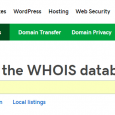How to choose a good Web Hosting Provider for Your Business
Nowadays, a website or a blog can be used for many purposes, for either personal hobbies blogs or professional business e-commerce. In the previous article, I’ve introduced to you about What is Web hosting and I think you’ve already known about it.
Table of Contents

Introduction
For personal purposes, a website can be used as a portfolio, or a place that people can share their hobbies, photos or their voices with family and friends. For businesses purposes, a website is a must for almost of company branding and presence.
These days, more and more people use the company’s website as a way of specifying the reputation as well as the legitimacy of a business and a company, especially in hosting industry.
Whenever finding a place to host a website for the first time, or whenever you need to substitute an existing service with a new one, you will need a good web hosting provider. There are many features you need to consider when choosing a web hosting package.
In order to help you guys having the best choice on these services, I have this article about 6 important features on how to choose a good web hosting provider. You need to keep in mind these features when shopping around.
Six important features on how to choose a good web hosting provider
1. Hosting Uptime Guarantee
Let’s try to imagine that some days, your site cannot be accessed due to the server is down then what will happen? If it’s a small personal blog, it may be irritating just for some people. But you will face the risk of losing thousands of dollars if your site is a big e-commerce website with tons of traffic every day

Host uptime or host reliability is the most important factor that you should carefully consider when choosing a web hosting provider. For e-commerce and business websites it is even more vital than personal blogs.
You also keep in mind that, claiming of 100% server uptime is likely not reliable, so try to be wary of this type of claims from many hosting providers. In fact, there are many times your website is down for a short period of time due to a scheduled maintenance or an unforeseen problem.
The important thing is that you need to know the actual uptime percentage for a server or a whole service you’re going to place the site.
With today’s technology, most hosting providers have appropriate plans to handle the scheduled outages as well as the scheduled maintenance. So they should have the historical data available. A low-reliability percentage is nearly not accepted on most of the websites having heavy traffic.
2. Initial Fees and Renewal Prices
Certainly, the price is a competitive factor comparing potential providers with each other. When buying something, the price is always a consideration, especially in economic times.

There are many different price levels based on the specified features of hosting packages. So that, you need to make sure that you cut down features that you don’t really want most. Always select the best combination of useful features and reasonable cost.
You should also think carefully about the payment types and plans, and specify which one suits you. Many hosting providers will give you more discount if you make a payment for the entire year (12-months) up front. There may be much more if you pay a 24-months or 36-months plan. Example with GreenGeeks or BlueHost, you will get the hosting plan just for $2.95/mo if you buy a 24-months or 36-months package.
Another example at Godaddy, if you buy at them for the first time, you will likely receive a discount just only $1/month, and this rate changes when you renew your plan. Make sure that you know this well before making any decision.
Thinking about free hosting? I should not recommend this type for any businesses reasons. Almost free hosting services you see on the internet has ads. So that, if you want to use them you have to accept their ads on your site. Read more: Compare Web hosting types – Some Pros and Cons you need to know
Sometimes these ads are banners or pop-ups annoying your readers and disrupt the site. You cannot hide or remove these ads unless upgrading to the premium plans. With business or company sites, this is unprofessional when having ads on pages; however, it may be acceptable if you’re running a small personal blog. But nowadays, there’re many cheap web hosting providers with high reputation then you don’t worry about that.
3. Hosting Space and Bandwidth
These 2 features are the most important considerations when choosing a web hosting package. Are you sure you will get what you need? Depending on the size and the number of files on your site, you will need the amount of space. Nowadays, most of hosting providers offer unlimited space as well as unlimited bandwidth. But rarely will you need full of space and bandwidth, so that doesn’t put too much expertise on this.
When people access your site, there’re files transferred between the users and your web server. The total of those data called bandwidth. The more traffic and bigger the site, the more bandwidth is used. However, you should be careful with this and make sure you have enough to adopt the requirements.
If you consume too much, they will probably suspend the site because, besides the bandwidth, CPU overusing is also a cause. You need to make sure to read the fine print of each provider carefully before buying; they always have clauses that allow them to terminate your site.
Most web hosting providers offer you higher packages if you’re running out of current resources and need to upgrade. However, you should think about the over usage fee instead of upgrading immediately to the higher plans.
4. Levels of Customer Services

Are you sure you will get help timely when you need them? Nowadays, customer service is also one of the important features that people are willing to accept besides the cost. If you’re running a big and popular site and need help when you’re under DDoS attack or having something miss configuration, the timely help will prevent the loss of your revenue as well as the traffic of your site.
Customer service is not only about technical support, it’s also presales questions, billing questions or anything related to business and technical issues. Many web hosting providers specify the support levels depend on the plan you buy. So that, select the hosting plans that have the best combining of options that you can reach them easily and timely.
4.1. Live Chat
This is the place where you can chat with a supporter to get help instantly with your problems. Sometimes you will need to reach them in order to resolve issues such as the payment type or your site becomes unavailable…You should consider the available times and the response times for this services
4.2. Ticket System/Email Support
This is the place where you can send the questions or any inquiries arising while using the services and receive the answers via email after that. The taking time and the response thorough should be considered
4.3. FAQ/Knowledge Base
This is simply the place listing the frequently asked and answered questions. They’re queries that were requested many times and get the same response. If you’re facing the same problem as listed in the FAQ or Knowledge base, you can follow the guide to fix it. No need to contact the support and then it saves you a lot of time.
Try searching the issues in the FAQ/Knowledge base before asking the supporter for help. If the hosting providers have a good and rich knowledge base, they will save the customers a lot of time and reduce the human resources in support.
4.4. Telephone Support
This means you can call to the supporter and deal with the issues you have instantly. This is especially helpful when you’re having heavy problems on your website or services you’re using. Make sure the telephone support is available 24/7 or just only in the business hour? The holding times and the knowledge of supporters should be also considered.
4.5. Community Forum
Some hosting providers have their own forum for supporting the customers. This is also a great way to let one customer get helps from others. When joining these forums, you need to consider the frequency of posts, active users as well as the moderators.
5. Company Stability in Industry

Nowadays in technology times, there are several hosting companies come and go in a short of time. I’m sure that you don’t want to buy services from a company and they suddenly disappear in the next few days. So you need to make sure that the company you’re going to join is not the one among of them. Checking the history of that company and make sure that they’re being for the long haul.
6. Company Reputation in the business

Read carefully the reviews about the hosting company on other forums and websites such as YouTube channel, reviews sites…before buying. The reputation of a web hosting provider is always essential. It’s an indication of worth and long-term cohesion. Make sure you’ve researched them carefully and have a right decision on which hosting provider to choose from.
Conclusion
If you’re serious about your online businesses then you should consider the 6 important factors on how to choose a good web hosting provider above carefully. It will help you to save a lot of time as well as resources in the long run. Research carefully the potential hosting providers before making any decision will also assure that you receive best services at a reasonable price with suit your needs on both personal and business.
Moreover, if you find hosting specifically for WordPress website, this article will help you What you need to know when buying hosting for WordPress website
Read more: How to start a WordPress blog easily (from A to Z)
Good luck to you,





After reading this “how to” guide I can choose a good one for my business
Good work and good luck to you!